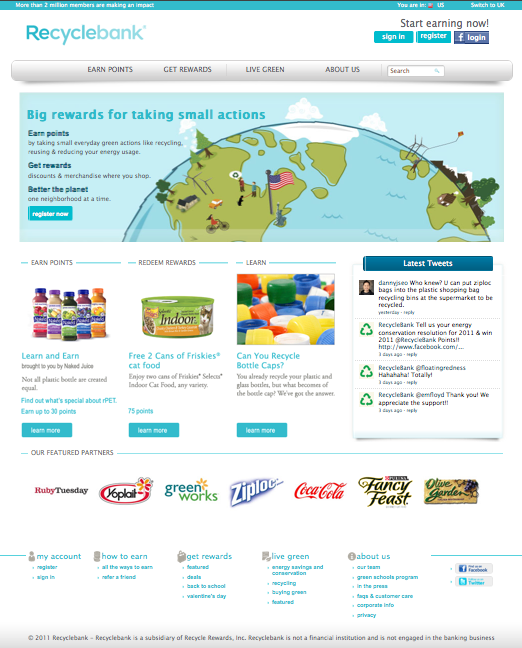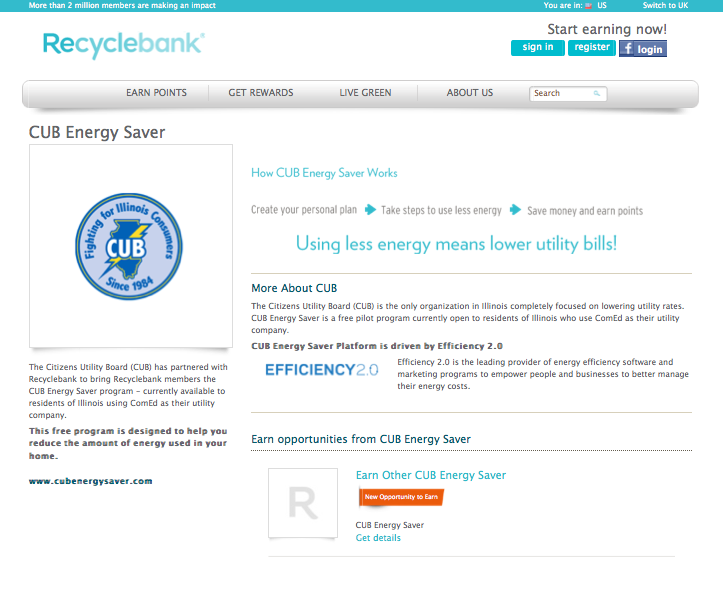 Recyclebank — a loyalty rewards program that encourages people to lower the environmental impact of their lifestyles, for example, by recycling more and tossing less — introduced a redesigned website and mobile apps, and began offering new services to customers and partners on Monday.
Recyclebank — a loyalty rewards program that encourages people to lower the environmental impact of their lifestyles, for example, by recycling more and tossing less — introduced a redesigned website and mobile apps, and began offering new services to customers and partners on Monday.
Chief executive of Recyclebank, Jonathan Hsu, said some of the new features he’s excited about, include:
1. “Learn and earn” quizzes that give RecycleBank users a small number of redeemable points for correctly answering questions about ecology, energy and the like.
2. Local search capabilities, encouraging users to do more “green” things around their communities, or to buy from more green service providers and suppliers near their homes, for points.
3. Rewards from more local, small-to-medium sized businesses, so members can cash in points for a discount at a sustainable grocer or dry cleaner within their zip code, not just redeem points for freebies and discounts from large chains.
4. Facebook, Twitter and further mobile integrations that let RecycleBank users interact with or access the site’s content and features via their iPhones and iPads now, and in coming quarters their Android devices.

Hsu recently completed his first 100 days as CEO at Recyclebank. The New York City startup is venture-backed by Kleiner Perkins, RRE Ventures and Sigma Partners, and was originally founded by Ron Gonen [editor’s note: to a commenter’s point, Gonen was the startup’s original CEO, and worked with co-founder Patrick FitzGerald to start the company]. Hsu said that the site and its new features hint at some of the changes to come for Recyclebank, overall:
“Today, Recyclebank is an innovative program to increase recycling in over 300 cities in the U.S. and U.K. The site redesign is all about the member experience. [It will] let members see their impact from recycling, and a number of other sustainable and community enhancing behaviors, beyond that, now. It helps people understand the context of their actions and where they fit in the world.”
With the ramped up search and content, the company stands to double its advertising and sponsorship revenue within two years. Hsu confirmed about 10 percent of RecycleBank’s revenue comes from ads and sponsored content now, and that even at maturity, it won’t likely comprise more than 25 percent.
Recyclebank’s move to offer points to users who implement energy efficiency measures at home — whether that’s by installing solar panels, turning off the lights more frequently, or insulating their homes better — could spell competition for other startups in the green consumer web space, from OPOWER to EnergySavvy.
Hsu says, however, he envisions Recyclebank as an agnostic provider of rewards programs to motivate and reward environmentally sound behavior, and help other companies do the same.

The CEO explained:
“In order to make a real impact, and move what’s going on in our communities and environment in a better direction, we have to collaborate with one another rather than compete.
Here’s an example, some waste haulers have their own incentive programs [editor’s note: like Waste Management’s Greenopolis]. However, we still work with three of the largest waste haulers in the world, Waste Connections, Republic, and Veolia.
In energy, there are a lot of individual device makers — including smart meter and solar companies — who have approached us to offer their products within our rewards catalog, to reach new members through our service and turn them into customers. Even more of them have asked us to allow their businesses to utilize our green currency to incent people to go ahead and make purchases [so they’ll earn points for using the devices over time].
Now, we’re lead generating for energy businesses, and motivating people through incentives around more than recycling. We are already working with Efficiency 2.0, but also hope to work directly with utilities like Duke Energy on this.”
Today, only a small amount of the company’s revenue comes from companies paying to offer green points to RecycleBank users, or “affiliate commerce.” Hsu says that should come to comprise the largest piece of Recyclebank’s business, over time.
The bulk of the company’s revenue currently comes from municipalities and waste hauler partners who pay Recyclebank a percentage of increased savings they generate by diverting trash from the waste stream to the recycling stream per city or campus.